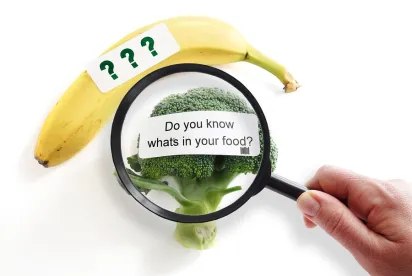The Office of Environmental Health Hazard Assessment (“OEHHA”) recently proposed a regulation that would provide more certainty to businesses regarding the Proposition 65 (“Prop 65”) warning requirements for cooked foods. The proposed regulation is intended to incentivize businesses to lower the concentration levels in foods, encourage consistency and predictability, and ensure that warnings will be given for the foods causing the highest levels of exposure.
The new proposed regulation publicized on August 4, 2020, significantly alters warning requirements for chemicals that are formed by the cooking or heat processing of foods, particularly acrylamide. The regulation would create an exception for any “producer, manufacturer, distributor or holder” from the warning requirement for chemicals that are “unavoidably created during cooking or heat processing, and that have been reduced to the lowest level currently feasible” under reasonable quality control measures.
What is Prop 65?
Prop 65 is a California law that requires California consumers receive warnings regarding the presence of chemicals known to cause cancer or reproductive toxicity. The law is highly technical, constantly evolving, and actively enforced by the government and private enforcers.
The Proposed Regulation Sets Maximum Concentration Levels and Outlines Consequences For Non-Compliance
There has been a lot of confusion in the food industry with the lack of guidance regarding the Prop 65 warning requirements for cooked foods. Additionally, there has been considerable frustration specific to the obligation to warn for acrylamide, which is often a byproduct of the cooking process for certain foods (such as almonds, bread, cookies, crackers, potato products, prune juice and waffles).
In an attempt to alleviate this confusion and frustration, the proposed regulation sets maximum concentration levels for acrylamide in certain foods. Each type of food described in the regulation has a maximum average concentration level and a maximum unit concentration level that businesses may use as a guide. If concentration levels fall below these enumerated levels for the types of foods described in the regulation, businesses need not provide a Prop 65 warning.
The regulation articulates that if a person does not reduce the level of the chemical in a food to the lowest level currently feasible, the resulting exposure must be calculated without regard to the maximum concentration levels set out in the regulation. If a business is unable to or chooses not to reduce the levels of acrylamide to the level adopted in the regulation, a warning would be required if the exposure is above the safe harbor levels for that chemical under the Act, unless another defense is available. The proposed amendment would not apply to parties to an existing court-ordered settlement or final judgment establishing a concentration of acrylamide in a specific product covered in that settlement or judgment.
Acrylamide Lawsuits Are On the Rise
It is no coincidence that this regulation was proposed amidst an influx of Prop 65 lawsuits relating to acrylamide in food. In October 2019, the California Chamber of Commerce filed suit in federal court seeking to enjoin California and private enforcers from requiring Prop 65 warnings on foods that contain acrylamide. The lawsuit stemmed from a lack of scientific data demonstrating actual harm from acrylamide in food, and a concern for over-warnings that would dilute the effectiveness of warnings on other products that actually do pose a risk to consumers. The California Attorney General filed a motion to dismiss the complaint challenging the Chamber of Commerce’s standing to pursue the lawsuit and the federal court’s jurisdiction to hear the dispute. On August 27, 2020, the court denied the Attorney General’s motion to dismiss and found that the plaintiff sufficiently alleged facts to show a credible threat of enforcement by the Attorney General.
Next Steps
The deadline to submit written comments to the proposed regulation is October 6, 2020. Public hearings on the proposed regulation will be set only by request, as long as the request is received by September 21, 2020. The proposed regulation, if adopted, would have a significant impact on the acrylamide related warnings in cooked food. We will continue to monitor all developments relating to this proposed regulation.




 />i
/>i

